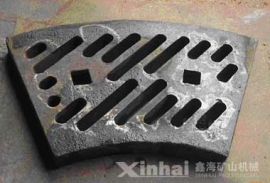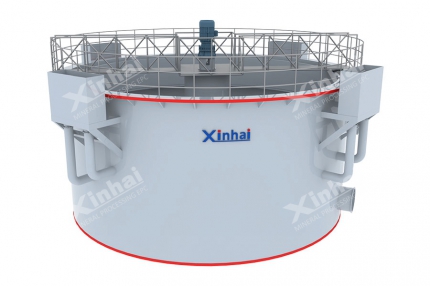Fluorite is one of the common non-metal minerals, also called fluor. The main component of fluorite is CaF2, so fluorite is the industry resource of F. Fluorite has a rich color, usually grows with scheelite, phosphorite, pyrite, blende, quartz, dolomite and other minerals. Flotation separation for the fluorite beneficiation is difficult for similar characteristics between fluorite and pyrite, barite.
It was born from volcanic magmas. During the cooling period, there are many materials in the gas water solution from the magmas. The main material is fluorine. The temperature and pressure decreased when the solution rises in the cracks. Since that, the fluorine combines with the calcium ion from surrounded stones into calcium fluoride, which makes up the fluorite after cooling. The pure calcium fluoride is without color. However, because of the special structure of fluorite, other ions can get mixed into it easily. So there is few colorless and transparent fluorite in nature and fluorite is the most colorful stone in the world. The natural fluorite is bright and colorful, which is known as 'the rainbow gem'.
The main producing area of fluorite is China, Africa, Mongolia, Russia, America, Thailand, Spain and other countries. China is one of the countries with the largest number of fluorite minerals in the world. There is a saying that: "World fluorite in China, China fluorite in Zhejiang, Zhejiang fluorite in Jinhua, Jinhua fluorite in Wuyi." We could know the large reserve of fluorite in China through this saying.

It is chosen the suitable fluorite beneficiation technology for through the row ore sliming rate, the impure minerals degree of symbiosis with fluorite, and the ore characteristics. Ordinarily, the fluorite beneficiation is suitable for gravity separation and flotation separation. Xinhai thinks that jig could be used in the gravity separation for the crude fluorite lump ore in the fluorite beneficiation plant.
Fluorite usually intergrow with sulfide ore, barite and quartz. Xinhai chooses suitable flotation separation technology as the main fluorite beneficiation technology to deal with the fluorite with sulfide ore. Xanthogenate as a collector first float the sulfide and then add collector of fatty acid in the pulp to float fluorite. We can also add a small amount of sulfide mineral inhibitors to inhibit the rudimental sulfide, which can make sure the quality of fine fluorite ore. Xinhai chooses bulk flotation technology fluorite beneficiation to deal with the fluorite with barite. The oleic acid can be used as collectors here. The bulk concentrate can be separated through direct flotation and reverse flotation into fluorite concentrate. Xinhai chooses fatty acid to capture fluorite when dealing with the fluorite with quartz. Water glass is used to restrain the quartz. The volume of the water glass needs to be controlled. A small amount can activate fluorite, but not restrain quartz. While too much of water glass would restrain fluorite. Some polyvalent metal ions can be used to increase the restraining effort of water glass. It also can be used for calcite.

Pyrite and fluorite can be captured by the fatty acid collector and both Calcium minerals. It is difficult to separate them through flotation.
At the question in researching the separation of fluorite and pyrite, the key point of the fluorite beneficiation technology is how to increase the floating difference of them. Under the alkaline condition, pyrite has a good floating condition, while under weak acid condition, pyrite is more difficult to separate. However, fluorite is similar to these two conditions. So pH can be controlled to increase the float difference, so that fluorite and pyrite can easily separate. The pH in fine fluorite beneficiation should be controlled from 6.4 to 6.8 according to experimental data.
On the basis of adjusting pH, pyrite inhibitor can be added to inhibit pyrite. Pyrite is carbonate mineral, so common agent assembly includes:
1. Tannin extract as pyrite inhibitor, 731 as fluorite collector in the fluorite beneficiation technology.
2. Acid sodium silicate as pyrite inhibitor dealing with raw ore, and using fatty acid as the collector in the fluorite beneficiation technology.
3. Using water glass, caustic starch and sodium hexametaphosphate as a mixed inhibitor, saponification oleic acid as collector for coarse flotation, and using water glass and citric acid as a mixed inhibitor for concentrating flotation.
There are many types of agent assemblies.


 marketing@ytxinhai.com
marketing@ytxinhai.com  0086 13810327080
0086 13810327080 






































































































 CHAT
CHAT MESSAGE
MESSAGE



